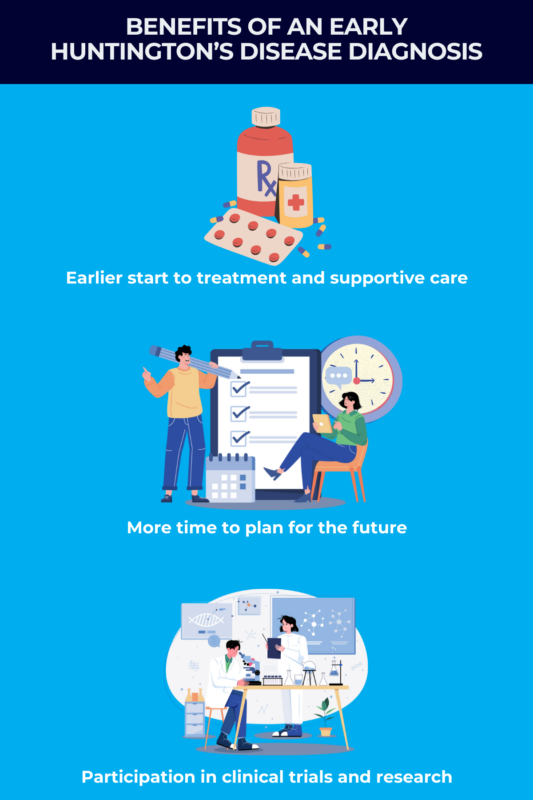 Discussion
Discussion
Benefits of an early Huntington’s diagnosis
Last updated Jan. 15, 2025, by Lindsey Shapiro, PhD

Huntington’s disease is a progressive neurodegenerative disorder marked by movement problems, cognitive issues, and other symptoms that worsen with time.
While there is no cure, getting an early Huntington’s disease diagnosis can make a difference, including having access to symptom-relieving treatments sooner and more time to plan for the future.
Genetic testing for the mutation known to cause Huntington’s can definitively establish a diagnosis when clinical tests point to the neurodegenerative disease, but it’s not always easy and it may take some time. It’s important to let your doctor know as soon as possible if you notice any concerning symptoms so that the diagnostic process can start as early as possible.
The importance of an early diagnosis
People with Huntington’s gradually lose their ability to perform daily activities independently due to worsening motor, cognitive, and psychiatric problems. Huntington’s disease life expectancy after diagnosis is usually around 10-30 years.
While learning of your diagnosis can be emotionally difficult, it is important you know whether you have Huntington’s disease for a number of reasons.
You can get treatment sooner
There are no cures or disease-modifying therapies that slow Huntington’s progression. But treatments to ease symptoms and supportive care can help lessen the impact on daily life that Huntington’s disease causes, allowing you to live as independently as possible.
Before you are diagnosed, doctors might not be able to treat your symptoms effectively because they don’t know what’s causing them. The sooner you know you have Huntington’s, the sooner you can have access to specialized care. You can therefore live more comfortably and have an overall better quality of life for a longer time.
You can start planning for the future
Having symptoms without a known cause can be frustrating and upsetting, so sometimes getting a confirmed diagnosis can bring some sense of relief.
Identifying the underlying disease may help you and your family — who may be more aware than you are of your behavioral changes — better understand what is happening. It also gives everyone a better sense of the future and how to prepare and plan for it.
For example, you can arrange your finances and make career or retirement plans. You can also make decisions about family planning. You should discuss your care goals with your healthcare team and caregivers so they understand what you want when you are no longer able to live independently.
You can participate in Huntington’s studies
There are many active research studies on Huntington’s. These include observational studies to learn more about Huntington’s disease progression, mechanisms, and patients’ experiences, as well as interventional clinical trials testing investigational therapies scientists believe might be able to slow Huntington’s progression.
Participating in a clinical trial is a way to access experimental treatments, which you usually would not be able to do. These studies often have specific recruitment criteria, and in some cases only enroll people who are in earlier stages of disease.
While there is no guarantee any treatment you receive in a clinical trial will be able to slow your Huntington’s, it is a possibility. It’s also a chance to contribute to research that may have benefits for people living with Huntington’s in the future.

Testing and screening for Huntington’s
Because of the importance of reaching a Huntington’s diagnosis early, it’s key to reach out to a doctor if you start noticing any concerning symptoms. Whether or not you have a family history of the disease, they can run tests to determine whether you have Huntington’s.
While Huntington’s hallmark symptom is chorea, or involuntary movements you can’t control, early signs of Huntington’s may include:
- stumbling and clumsiness
- depression
- irritability
- memory lapses
- difficulties in learning new things, making decisions, or concentrating.
To make a preliminary diagnosis of Huntington’s, a doctor will first ask you about your medical history to get a sense of what you’ve been experiencing and for how long. Because Huntington’s is a genetic condition that typically runs in families, they’ll also ask about your family history, including if any family members have been diagnosed with Huntington’s or experienced related symptoms.
If at this point they suspect you could have Huntington’s, there are a few other tests they might run to further evaluate your symptoms.
- A neurological exam, involving a series of simple tests to assess your motor, sensory, and psychiatric function, may be performed which might include tests of muscle strength, balance, vision, hearing, and mood.
- Cognitive testing would evaluate things such as memory, language skills, and reasoning.
- A mental health evaluation would assess other factors that could influence symptoms such as emotional state, behavioral patterns, signs of disordered thinking, or substance abuse.
- Brain imaging studies, such as an MRI or CT scan, would determine whether there are changes in the structure or function of brain areas known to be affected in Huntington’s. Results may also help rule out other brain disorders with overlapping symptoms.
While all of these tests can help doctors identify any Huntington’s disease symptoms, a Huntington’s disease diagnosis relies mainly on motor symptoms.
If after these clinical tests your doctor strongly suspects you have Huntington’s, a definitive diagnosis can be made with genetic testing, which looks for the disease-causing gene mutation. This is the most definitive Huntington’s disease diagnosis test.
In cases where Huntington’s is known to run in the family, a person without symptoms might also choose to discuss Huntington’s disease and genetic testing with their doctor. There are a variety of reasons why an at-risk person might choose to undergo genetic testing for Huntington’s or decide against it. A genetic counselor can help guide you in making this highly personal choice.
Difficulties diagnosing Huntington’s
While genetic testing can confirm your symptoms are related to Huntington’s, a physician has to be relatively certain Huntington’s is a reasonable diagnosis before requesting such testing. This can be challenging for doctors in a few different ways.
Variable symptoms
The course of Huntington’s can be highly variable, and you can experience a range of different motor, cognitive, and psychiatric changes as early symptoms.
And while motor symptoms are mainly used to make a diagnosis, they’re not always the first symptoms. Moreover, severity of symptoms and their age of onset can also vary, even among members of the same family. For these reasons, an early diagnosis often requires a specialist who is familiar with the disease’s complexity.
Subtle or nonspecific symptoms
Some common early Huntington’s symptoms are nonspecific. It can be hard to link such symptoms directly to Huntington’s, especially in cases where there is no known family history of the disease, as they’re also common in the general population.
Moreover, even symptoms that are more indicative of Huntington’s, like chorea, can be very subtle early on. They may not be causing any obvious problems in the beginning and consequently are not recognized.
Overlapping symptoms
Huntington’s disease symptoms can also be similar to other conditions, such as other neurodegenerative diseases or movement disorders, complicating the diagnosis. For example, while chorea is a hallmark of Huntington’s, affecting the vast majority of people diagnosed with Huntington’s, it is also a symptom of many other conditions. Furthermore, the early psychiatric symptoms of Huntington’s can be confused with different psychiatric conditions such as schizophrenia.
In most cases, a careful review of a person’s symptoms by a trained specialist can help accurately distinguish Huntington’s from these other conditions.
Ongoing research on potential early markers
Research suggests there are likely subtle disease processes that begin before people with Huntington’s experience the motor or cognitive problems that lead them to see a doctor — possibly several years earlier.
Scientists are working hard to better understand these biological changes and establish ways of identifying them for making earlier diagnoses. Much of this research relies on people who are carrying the disease-causing mutation but not yet showing symptoms. Because it’s essentially certain they’ll develop Huntington’s at some point in their lifetimes, they can be examined and followed in the long term to identify early clinical indicators or biomarkers showing the disease is emerging.
Should therapies to slow Huntington’s progression eventually be developed, confirming a diagnosis as soon as possible would allow for starting these therapies, which could change the course of the disease.
Huntington’s Disease News is strictly a news and information website about the disease. It does not provide medical advice, diagnosis or treatment. This content is not intended to be a substitute for professional medical advice, diagnosis, or treatment. Always seek the advice of your physician or other qualified health provider with any questions you may have regarding a medical condition. Never disregard professional medical advice or delay in seeking it because of something you have read on this website.
Recent Posts
- I insist on being seen as I am, not as someone else’s story
- FDA requests additional clinical trial of Huntington’s gene therapy AMT-130
- A log cabin miles from anywhere was just what the doctor ordered
- The invisible battle of staying present with Huntington’s disease
- Combining 2 drugs could slow nerve cell death in Huntington’s: Study
Related articles
-
 Discussion
Discussion
-
-
-



